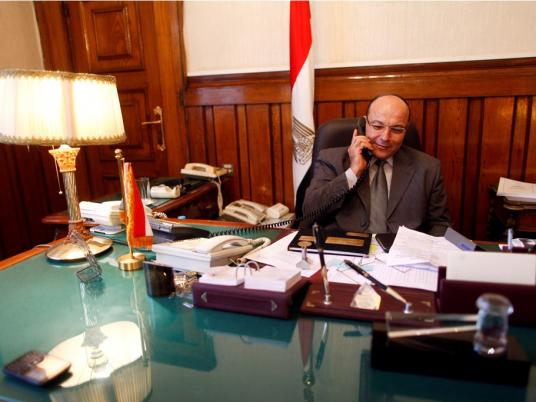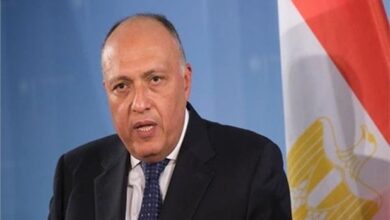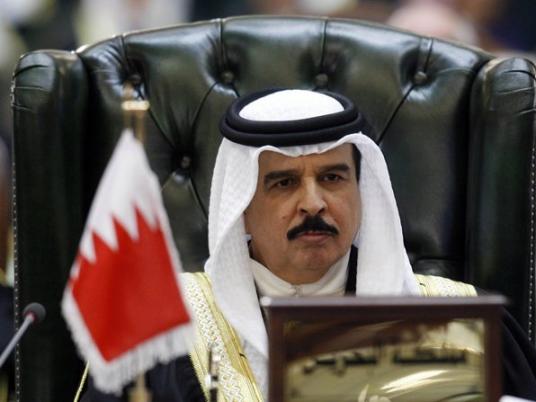
There is renewed talk about Egypt’s new prosecutor general, with conflicting narratives circulating as to what Talaat Ibrahim Abdallah has been doing for the past five years before returning to Egypt in November. The official narrative is that he was on secondment in Kuwait, while there are other reports showing that he was in fact passing politicized sentences in Bahrain, where protests have been dealt with harshly since the beginning of 2011.
State media reports that Abdallah was on secondment in Kuwait from 2007 to November 2012 when he returned to Egypt and was sworn in as prosecutor general.
However, other evidence suggests that Abdallah was on secondment in Bahrain from 2007 to 2012. Bahraini human rights groups allege that while serving as a judge in the Gulf country he handed down politically motivated sentences to opponents of the Khalifa regime alongside chief presiding judge Mohamed al-Khalifa. Court records attest to his role in Bahraini courts.
It was Khalifa and Abdallah who sentenced seven defendants to life imprisonment in the “Ma’amir case.” Defense witnesses told the court that the men confessed under torture. Abdallah also heard the Hujaira case in which prominent opposition activists were accused of “establishing an illegal group for the purpose of undermining the constitution of Bahrain” and other crimes.
As part of a 2010 report on the use of torture during interrogations in Bahrain, Human Rights Watch describes how state-controlled television broadcast “confessions” by the defendants in the case shortly after their arrests.
The case was eventually shelved in April 2009 when the defendants were pardoned by the king.
Abdallah took his position as prosecutor general following a controversial constitutional declaration on 22 November in which President Mohamed Morsy dismissed former Prosecutor General Abdel Meguid Mahmoud.
The new prosecutor general is being put to test with several critical cases, such as the allegations by figures associated with the Muslim Brotherhood — from which Morsy hails — that the president’s opposition is being sponsored from abroad to destabilize the country. Chosen by the president in what is deemed by many observers as a staggering intervention of the executive in the judiciary, Abdallah had previously championed the independence of the judiciary.
Abdallah was born in Tanta, Gharbiya, in 1958. He began his career as district attorney before working as an attorney general. He later became a judge at the Court of Cassation and then its vice president.
Abdallah enjoys a good reputation among those in the judicial field, largely because he was one of the icons of the independence movement which appeared in 2005. The movement consisted of a group of lawyers, including current Justice Minister Ahmed Mekky, who called for an independent judiciary and opposed former President Hosni Mubarak’s regime intervention in its work.
Abdallah played an important role in documenting the violations and fraud committed during the parliamentary elections in 2005 when the Judges Club appointed him to a fact-finding committee to uncover elections rigging and any instances of fraud.
Despite this reputation, Abdallah’s mission may have been made difficult by the way he replaced Mahmoud. While Morsy’s decision to appoint a new prosecutor general was lauded as a revolutionary move to get rid of one of Mubarak’s men, others considered it a flagrant violation of judicial authority and a setback on the journey toward the independence of the judiciary.
Ahmed Seif, a veteran human rights lawyer, believes Abdallah has his work cut out for him and that his success will depend on his ability to delicately address this situation where his appointment is both seen as a revolutionary decision and potentially also an obstacle on the road to judicial independence.
According to Seif, Abdallah is faced with the challenge of reforming the public prosecution following years of negligence and persuading the possibly reluctant prosecution employees to cooperate with him after his controversial appointment.
“Abdallah may reopen investigations into the killing of protesters, like the constitutional declaration suggests, but the real challenge he will face is the possibility of producing outcomes different from those reached in the former investigations,” Seif says.
A new constitutional declaration issued by Morsy on 8 December cancels the 22 November declaration, but keeps the article pertaining to retrials of old regime figures implicated in the killing of protesters, and adds two more conditions. First, only if new evidence emerges in cases pertaining to the killing or injuring of protesters would a retrial take place, and secondly, the time span for these cases was set as 25 January 2011, the day the revolution kicked off, until 30 June 2012, the day Morsy took over.
This second condition means that cases implicating members of the Armed Forces during the transitional rule of the Supreme Council of the Armed Forces are included, while incidents that have taken place under Morsy’s own rule are excluded.
Zaghloul al-Balshy, head of the Judicial Inspection Authority at the Justice Ministry, said Abdallah’s good reputation makes him well-qualified for the position and added that everyone will cooperate with him, particularly district attorneys, because the law states that they are his deputies.
“I do not believe workers in the judicial field will have reservations on cooperating with the new prosecutor general, particularly at this critical stage in Egypt,” he says.
Even though he emphasizes Abdallah’s respected reputation, Nasser Amin, the head of the Arab Center for the Independence of the Judiciary, says the appointment of a prosecutor general who belongs to the independence current is not necessarily a guarantee for judicial independence, particularly after “observing the performance of some of the current’s members in official positions.”
Amin adds that the way the new public prosecutor was picked suggests a Mubarak-loyal prosecutor general was replaced with a Morsy-loyal one.
“The choice was made without the knowledge of the Supreme Judicial Council, even though under Mubarak its opinion was solicited in the choice or it was asked to recommend figures for the position,” he says.
Additional reporting by Sarah Carr




